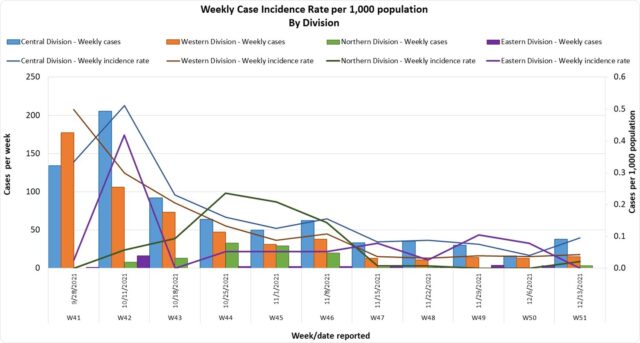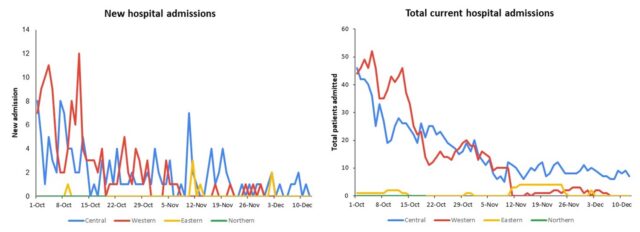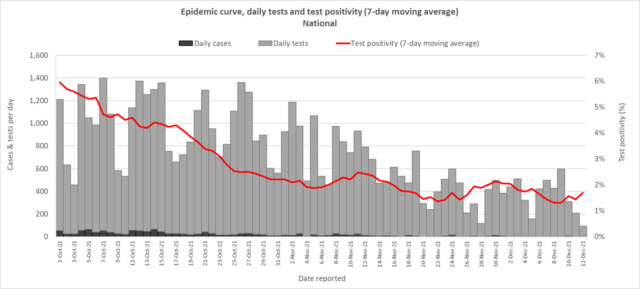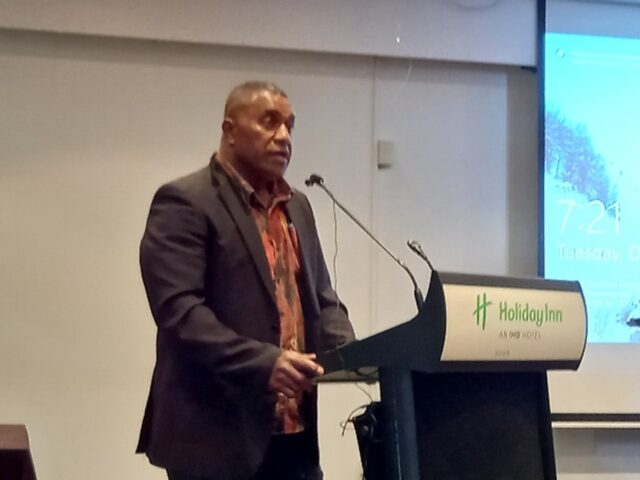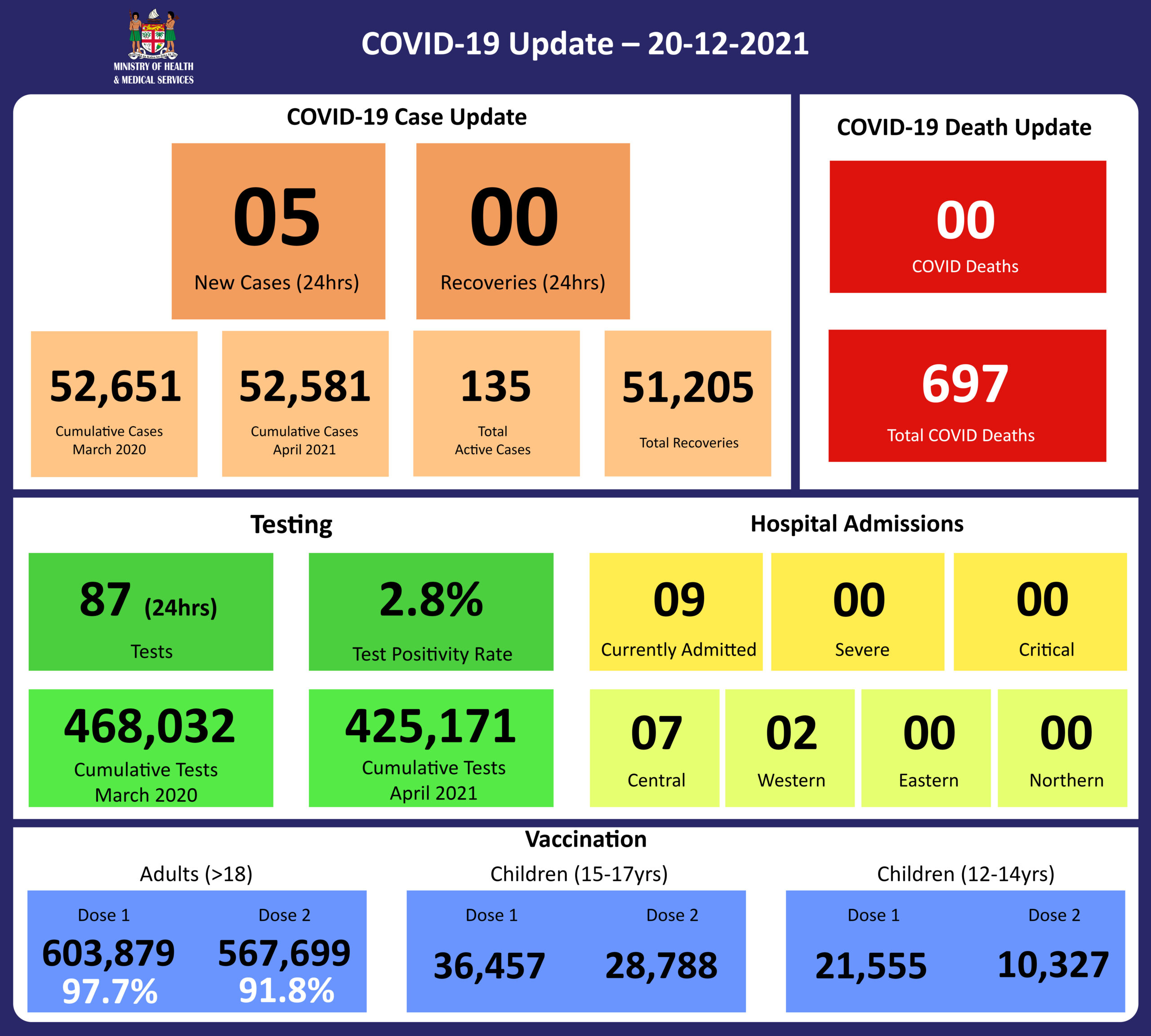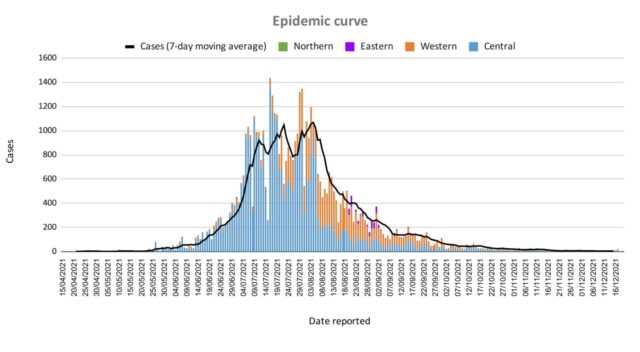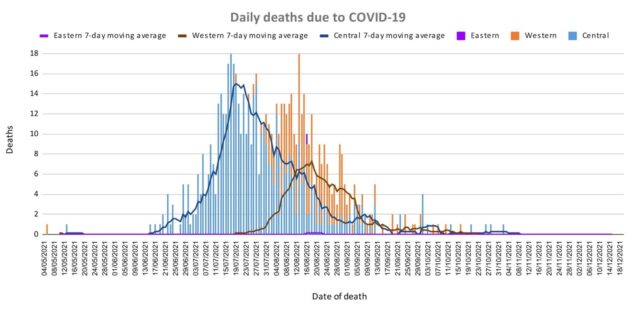COVID-19 Situation Update
Wednesday, 22nd December
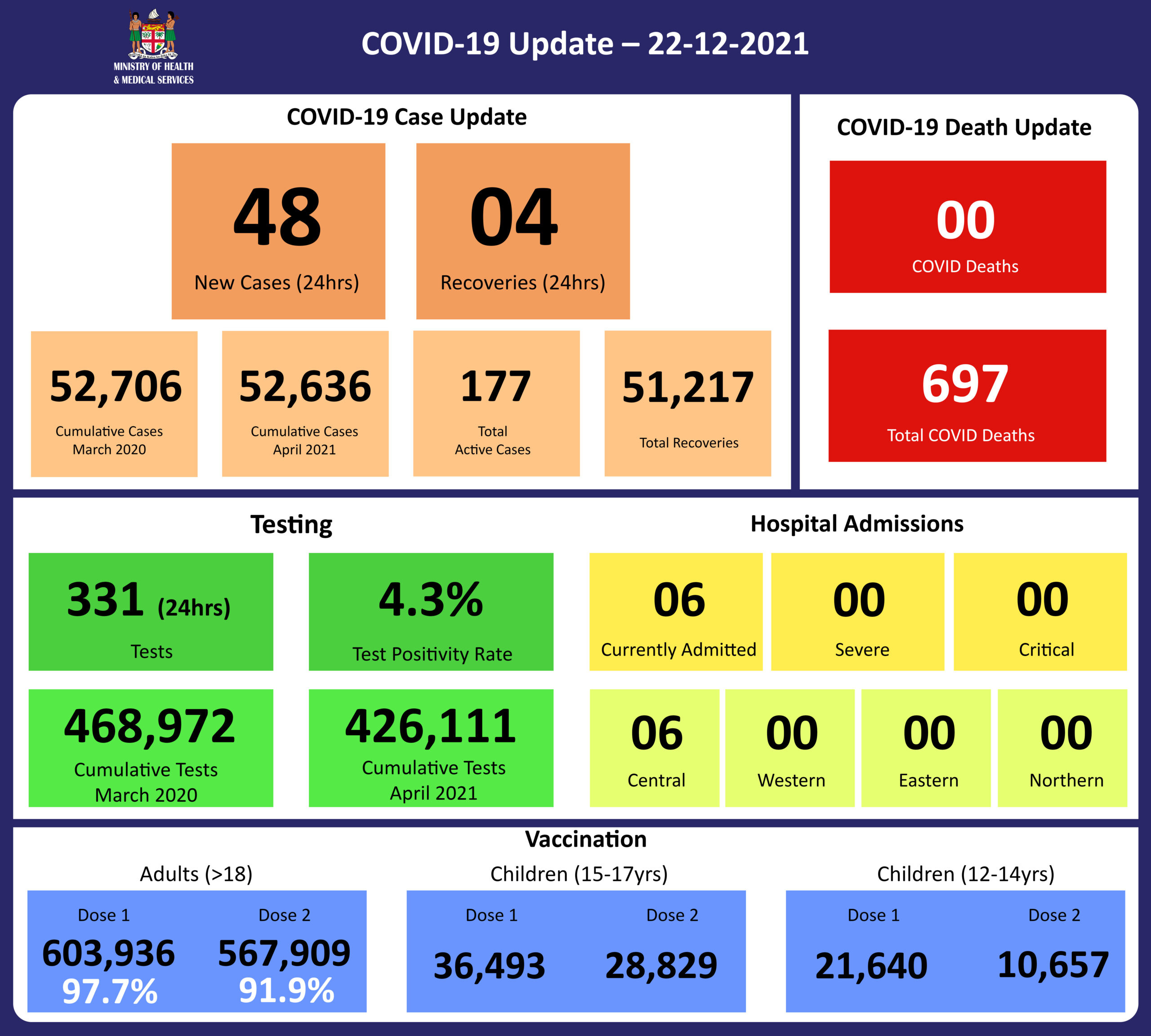
| Transmission Update:
In the past 7 days until 21/12/2021, 34 cases were recorded in the Central division, 15 new cases in the Western division, nil new cases in the Eastern Division, and 3 new cases in the Northern Division. The Central Division cases constitute 71% of the cumulative total cases nationally, with the Western division making up 28% and 1% in the Northern and Eastern Divisions. Since the last update, we have recorded 53 new cases of which 5 new cases were recorded on 21/12/2021 and 48 new cases in the last 24 hours ending at 8 am this morning. Of the 48 cases recorded in the last 24 hours, 36 cases were recorded in the Northern Division; 11 cases were recorded in the Western Division with 5 cases from border quarantine, and 1 case recorded in the Central Division. The national 7-day rolling average of cases as of 18th December is 8 daily cases. The peak weekly incidence in the western division was approximately a third of that in the central division, and the cumulative case numbers are also reflecting a similar difference. |
| Deaths:
This curve depicts the weekly death rate per 1000 population by divisions since October 2021. Overall, the death rate graphs for the Central and Western Divisions indicate a declining trend. The differences between the Central and Western are similar to the incidence of the weekly cases and are likely a reflection of vaccination levels, COVID mitigation measures, and differences in population density. There is no COVID-19 death to report. There have been 697 deaths due to COVID-19 in Fiji, with 695 of these deaths during the outbreak that started in April this year. Please note that due to the time required by clinical teams to investigate, classify and report deaths, a 4-day interval is given to calculate the 7 days rolling average of deaths, based on the date of death, to help ensure the data collected is complete before the average is reported. Therefore, as of December 18th, the national 7 days rolling average for COVID-19 deaths per day is 0.0, with a case fatality rate of 1.32%. We have recorded 613 COVID-19 positive patients who died from serious medical conditions they had before they contracted COVID-19; these are not classified as COVID-19 deaths. |
| Hospitalisation:
The downward trend in both the new hospital admissions and total admissions in all hospitals admitting COVID-19 patients across the country is consistent with the cases and death trends. The hospital admissions continue on a downward trend indicating a sustained positive response to COVID mitigation measures, Population density differences, and differential Vaccination rates. |
| Testing:
331 tests have been reported for December 21st, 2021. The 7-day daily test average is 350 tests per day or 0.4 tests per 1,000 population. The national 7-day average daily test positivity is 4.3%, which is within the WHO recommendation of 5%, and this is illustrated by the lab testing graph. The increased positivity rate is an indication of the continued surveillance undertaken in high-risk areas to detect cases early and mitigate the risks of community transmission. This also indicates the need for heightened vigilance in all communities and adherence to COVID safe measures. |
Epidemic Outlook:
The Ministry of Health continues to monitor the outbreak using indicators such as daily case numbers, hospitalizations, test positivity, and deaths.
Occupancy rates in health facilities, the occupancy rate of ICU beds, death rates, and vaccination coverage are indicators to monitor our health response capacity and we see a decreasing trend across indicators from our health facilities with increasing vaccination coverage for adults, 15-17-year-olds, and 12-14-year-olds in Fiji.
With international travel open, we anticipate our testing numbers to increase from international repatriates and travelers including Fijians visiting families and friends. With increasing COVID-19 cases in the European and Americas region, and the emergence of the new variant Omicron, we anticipate continued surveillance and testing at our borders, communities, and maritime islands to monitor and detect cases for early intervention.
Locally, we are slowly seeing an increase in the number of cases and anticipate these numbers to continue to increase. Early detection will enable early interventions to mitigate COVID-19 risks.
Public Advisory:
In the Northern division, we have recorded 29 cases on RT-PCR while 74 cases have tested positive through RDT’s and are presumed COVID-19 positive unless disproved on RT-PCR. Cases in the Northern Division were expected once the borders between Viti Levu and Vanua Levu were lifted in November for fully vaccinated travelers after 80% vaccination coverage was achieved. It was expected that while cases will occur in the community in the Northern Division, the high vaccination coverage would mean that fewer people will develop the severe disease when compared to the outbreaks on Viti Levu. However, as with the rest of Fiji, we are urging everyone in the Northern Division to continue to adhere to COVID-19 safe measures. We know that those who remain unvaccinated and some people whose immune systems have not been able to develop a good response to the vaccines will still be at higher risk of severe disease. The international spread of the Omicron variant gives further reason for everyone to adhere to COVID-19 safe measures as well as vaccination. In response to the increase in cases in the North the health teams with other government agencies will work tirelessly to institute mitigation measures and prepare our health facilities should there be a rise in severe COVID-19 cases.
In my public advisory on the 15th of October, I had reminded the people of the North that “together with vaccination, we must continue to closely observe our COVID safe measures and avoid contained spaces and crowds to avoid the risk of increased spread of the virus. The key to avoiding future restrictions and lockdowns is for the public to remain cautious about how they engage in the greater freedom they will enjoy”. In this festive season, we must celebrate responsibly and safely.
Again, we are reminded of the continued threat we face from the COVID-19 virus and its variants. However, our prevention measures remain the same: when outside your home maintain at least 2-meter physical distancing from others; mask wisely by carrying a mask when you out of your home and wear the mask properly in public indoor spaces, public service vehicles, and outdoor crowded spaces; open windows to improve ventilation; avoid poorly ventilated or crowded spaces; keep hands clean; cough or sneeze into a bent elbow or tissue, and get vaccinated when it’s your turn. We have also announced today that anyone over the age of 18 is now eligible to receive a booster dose of the Moderna vaccine as long as it has been at least 5 months since your second dose of vaccine. The list of sites where the booster dose is available has been published.
We have new stocks of booster doses for the elderly, vulnerable, and front liners; and the vaccination of children will continue. We continue to promote COVID safe behavior in our messages and use legal measures we have in our hands for enforcement. We continue to work with businesses and schools to foster COVID safe measures to become an automatic habit.
We want to facilitate the reopening of society in a way that does not cause mass illness and death. We cannot eradicate SARS-CoV-2 but we can plan to ensure that what comes into Fiji is well known and we have enough vaccination cover and COVID safe habits in the community to protect ourselves and the freedoms we enjoy.

